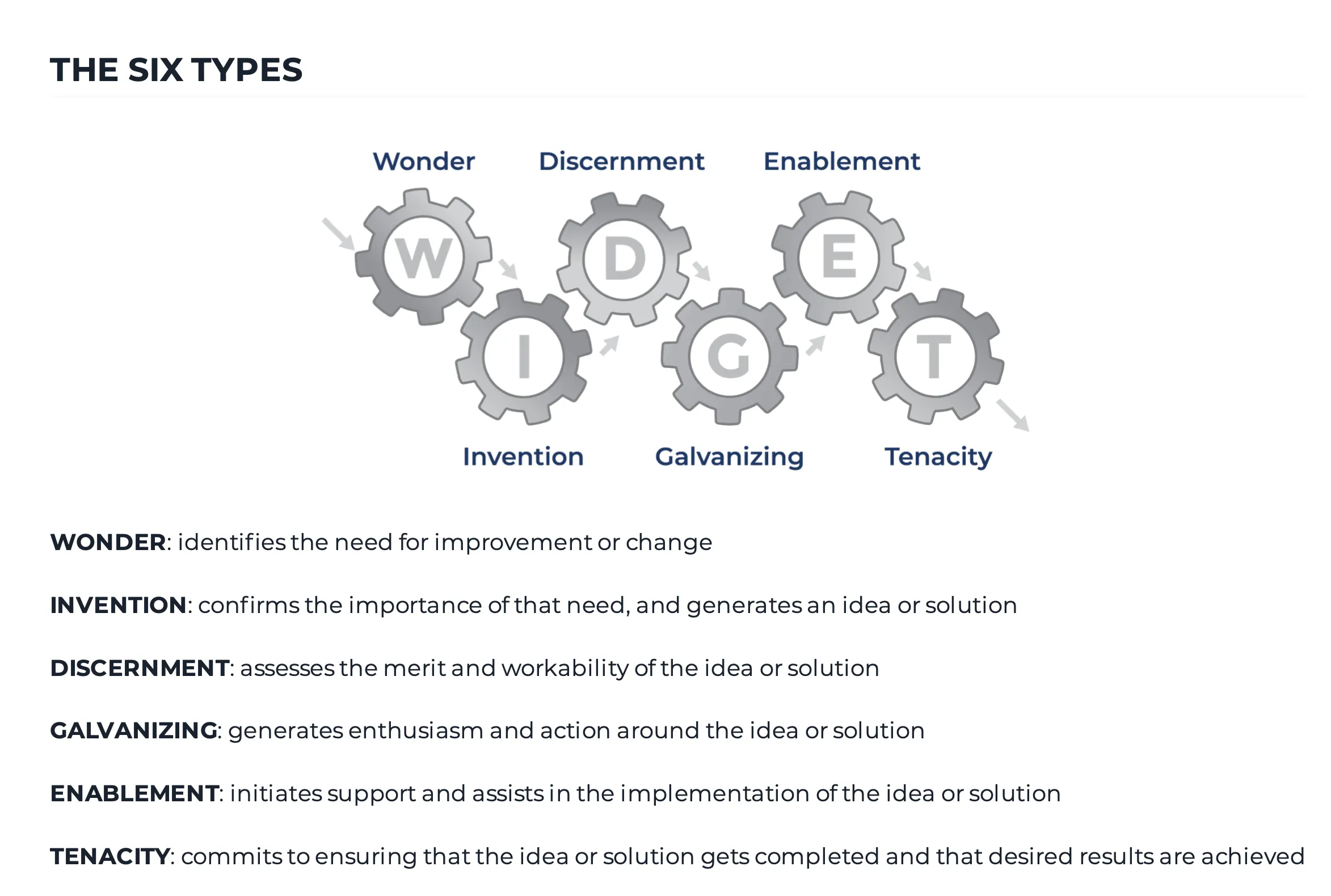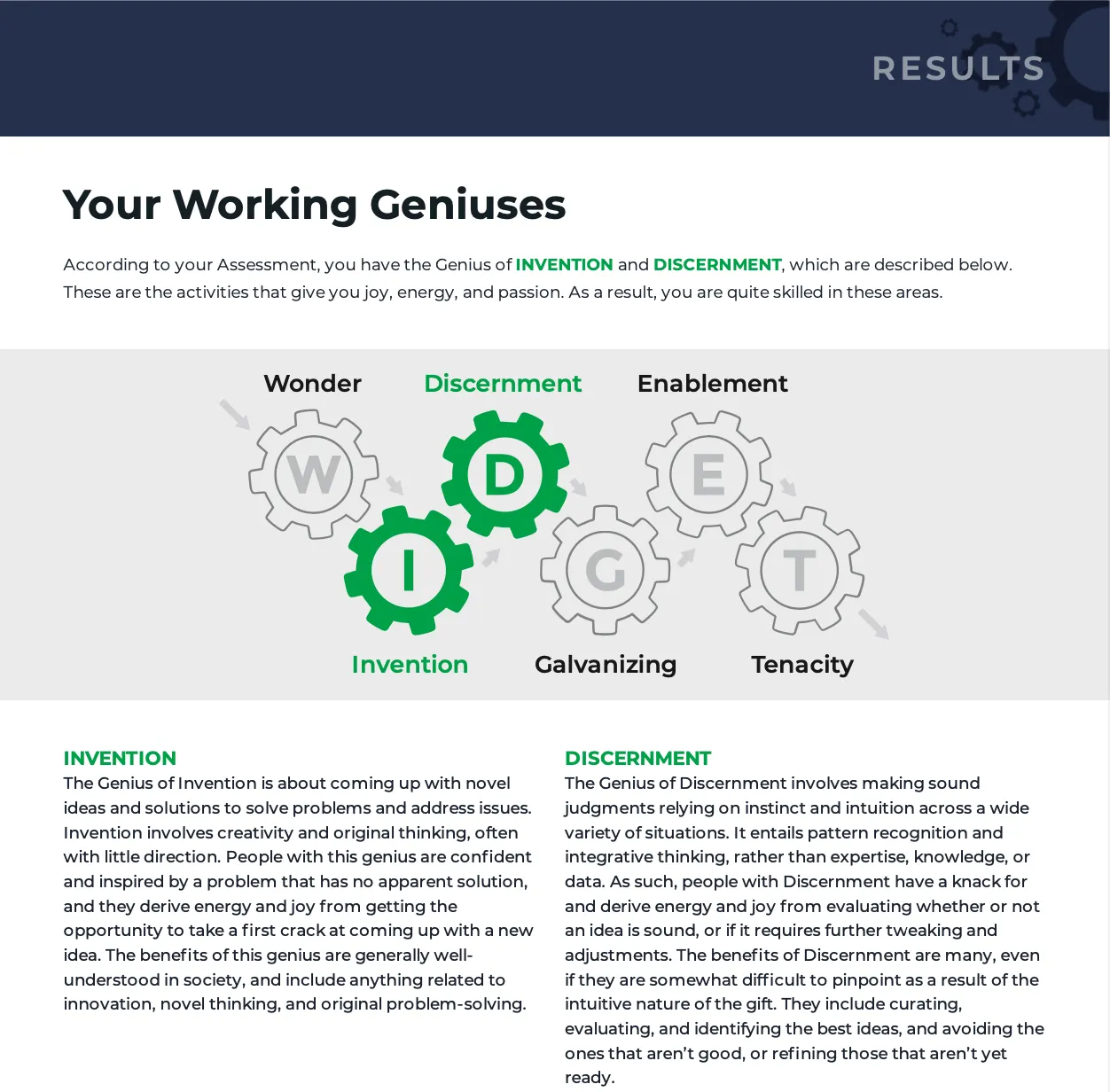My Working Genius Free Test Review (2025): Results, Insights & Best Alternatives
Have you ever wondered what your natural strengths are at work and how they affect your productivity and collaboration?
In this review, I share my personal experience with the Working Genius Test, one of the fastest-growing assessment tools in 2025. I’ll walk you through how the test works, my actual results, whether it’s still free, and how it compares to tools like CliftonStrengths and Kolbe. If you’re looking to unlock your genius and find free or paid options that actually work, this is your complete guide
📥 Want to Discover Your Genius Type Instantly?
Click The Image Below to Take the Working Genius Free Test
Table of Contents:
- What is the Working Genius Test?
- Is It Still Free in 2025?
- The 6 Types of Genius (Explained Simply)
- My Results from the Test
- Pros and Cons
- What Reddit Users Are Saying
- Working Genius vs CliftonStrengths vs Kolbe
- Free & Paid Alternatives
- Should You Take It? Final Thoughts
- FAQs
Key Takeaways:
The Working Genius Test is a personal assessment that helps individuals identify their unique strengths and how they can be utilized in the workplace.
In 2025, the Working Genius Test is still available for free and offers insights into 6 types of genius: Wondering, Inventing, Discerning, Galvanizing, Enablement, and Tenacity.
The Working Genius Test has been praised for its accuracy and practicality, with Reddit users sharing their positive experiences and comparing it to other popular tests like CliftonStrengths and Kolbe.
What’s the Working Genius Test?

Pat Lencioni developed the Working Genius model to improve team building and productivity.
The Working Genius Test, created by Pat Lencioni and his team at The Table Group, is a really useful tool for improving team dynamics and personal growth. It helps me identify my strengths and weaknesses when it comes to productivity and effective communication.
This cool behavior assessment sorts people into different 'Working Genius' types, giving me great insights into how I contribute to my team. With the growing emphasis on teamwork, especially in leadership and team-building workshops and higher education settings this Working Genius model is all about changing how teams collaborate and work together efficiently. Recent developments, such as Patrick Lencioni's partnership with Leadr , highlighted by Newswire, further reinforces the importance of innovative tools like this in reshaping team dynamics.
Is the Working Genius Test Still Free in 2025?
As of 2025, I've found that the Working Genius Test still has a free online assessment option. This is a great way for both individuals and teams to explore their unique genius types without spending a dime, making it super accessible for boosting team productivity and effectiveness through qualitative reviews and quantitative results.
The free version is definitely a good starting point for getting to know personal strengths and weaknesses in collaboration, but I've noticed it has some limitations in depth compared to the premium offerings. The free report might not give me all the comprehensive insights and tailored recommendations that could really help improve team dynamics.
For those of us looking to dig a little deeper and uncover more meaningful insights, there are discounted premium options available for detailed assessment reports. These packages offer extensive reports and resources that can really equip teams with the knowledge needed to create a high-performing and harmonious working environment. This aligns with findings from Gartner , which suggests that understanding team dynamics is crucial for adapting to future work trends.
The 6 Types of Working Genius

This assessment is key for team dynamics and personal strengths.
The Working Genius Test breaks people down into six different types of "Working Genius," each highlighting a unique way they contribute to team dynamics and collaboration.
We've got the genius of wonder, invention, discernment, galvanizing, enablement, and tenacity .
These types help me understand how I can leverage my strengths and tackle any frustrations I might face while working with others, ultimately boosting productivity and teamwork.
Knowing these types isn’t just great for my personal growth; it’s also super helpful for mapping out team dynamics and figuring out how to build the ideal team player. For those interested in a deeper understanding of how personality types can affect team performance, this Forbes article is recommended reading.
1. The Genius of Wonder
The Genius of Wonder is an essential part of the Working Genius model.
I believe that the genius of wonder is all about having the ability to question things and explore new possibilities. This really sparks creative thinking and innovation within my teams.
When this quality is present, everyone feels enabled to share their unconventional ideas and push back against the usual way of doing things. For example, during brainstorming sessions, I notice that those who embody this spirit encourage everyone to think outside the box, which can result in some truly groundbreaking solutions.
When my team takes the time to dive into imaginative concepts without any judgment, it not only strengthens our camaraderie but also boosts our productivity. In software development, I’ve found that when teams embrace this mindset, the iterative design process often leads to more user-friendly products, while also fostering a culture of continuous improvement and collaboration.
2. Inventing Ideas
The Genius of Invention helps with the assessment process and creating new solutions.
I’ve noticed that folks with a knack for invention really shine when it comes to coming up with new ideas or solutions. They play a crucial role in the innovation process within teams.
Their ability to think outside the box helps us tackle obstacles that might slow us down otherwise. For example, when we use an assessment tool to pinpoint areas for improvement, their input can really spark some creative brainstorming among team members, leading to fresh approaches to the challenges we face.
By creating an environment that values inventive thinking, we boost our collaboration and improve our outcomes.
In a recent project, bringing in these inventive minds made a huge difference. We developed streamlined processes that really ramped up our efficiency, demonstrating just how powerful imaginative problem-solving can be in driving our team's success.
3. Discerning Insights
The Genius of Discernment helps our communication and evaluations.
I believe that the genius of discernment is all about the ability to evaluate ideas and provide insights, making sure that our team decisions are well-informed and effective.
By using my critical thinking skills, I can sort through complex information, spot biases, and bring attention to assumptions that might affect our decision-making process. This analytical approach helps us break down different perspectives, leading to a clearer understanding of the issues we’re facing.
As I share my findings, I’m helping my teammates navigate through uncertainty, creating a collaborative vibe where everyone feels like they can pitch in.
In short, having the ability to discern not only sharpens our focus as a team but also boosts our overall effectiveness, enabling us to tackle challenges with confidence and clarity.
4. Galvanizing Team Spirit

The Genius of Galvanizing enhances team collaboration and engagement.
I find that people who really know how to galvanize a team are incredible at rallying everyone together and boosting morale. They have this knack for motivating others, which really encourages collaboration.
When they inspire a shared vision and create an environment where everyone feels valued, they become the driving force behind improved performance. For instance, when faced with project challenges, I might organize brainstorming sessions that not only promote open dialogue but also allow team members to share their unique perspectives.
This approach doesn’t just spark creativity and good problem-solving; it also helps build stronger relationships among us, making our team more cohesive.
With their outstanding communication skills, they really encourage feedback and foster trust, which ultimately ramps up productivity and creates a real sense of belonging within the group.
5. Enablement: The Power of Support
The Genius of Enablement is all about providing the support and assistance others need to move ideas forward. People with this genius are naturally responsive and thrive when they're helping teammates succeed.
In my experience, Enablement shows up when someone jumps in without hesitation to help implement someone else’s vision, not by taking over, but by offering genuine support. This genius is essential for creating momentum inside a team because it ensures that ideas don’t just sound good; they start moving.
Teams with strong Enablement have fewer bottlenecks and more follow-through. These individuals are highly attuned to what others need and are quick to offer help in a way that empowers, rather than enables dependency. It’s not about being a yes-person, it’s about offering real, meaningful assistance that helps the team make progress.
6. Tenacity: Driving Results to the Finish Line
The Genius of Tenacity is the relentless drive to push projects across the finish line. People with this genius are naturally wired to take satisfaction in completing tasks, hitting targets, and ensuring work gets fully executed.
This genius plays a critical role in avoiding the “idea graveyard” where great initiatives fizzle out due to lack of follow-through. Tenacious team members thrive on closure. They ask: “Did this actually get done?” and they’re the ones making sure deliverables are completed to spec.
In my own work, Tenacity has been the difference between brainstorming a cool project… and launching it. These individuals bring accountability, discipline, and a results-driven mindset. All of which are essential for any team trying to turn plans into tangible success.
My Results from the Working Genius Test

After taking the Working Genius Test, I found out my unique mix of genius types, which gave me some really helpful insights into my strengths and where I could use a little improvement. It’s been like having a personal development tool right in my pocket, especially useful for career leadership and in-person retreats.
This assessment showed me my natural tendencies in a team and how they affect our work together. By figuring out these qualities, I realized how my genius types, especially my knack for generating ideas and having gut-instinct really boost clarity in direction for a project's vision and create a more productive atmosphere.
Understanding my role in the Working Genius model has helped me appreciate the different strengths my teammates bring to the table, which has led to better communication and teamwork effectiveness. Embracing these insights has enabled me to make meaningful contributions, making sure our collective efforts align with everyone’s unique skills.
The Pros and Cons of the Working Genius Test: Insights from The Ideal Team Player
I find that the Working Genius Test has perks, like boosting my self-awareness and helping my team be more productive and enhance campus engagement.
However, I've also noticed a few drawbacks that I think everyone should keep in mind before diving headfirst into using this assessment tool.
What Reddit Users' Thoughts on the Working Genius Test
I've noticed a lot of buzz around the Working Genius Test on platforms like Reddit. People are really diving into discussions, sharing their reviews, experiences, and thoughts on how effective it is at improving team dynamics and productivity.
Many users seem to appreciate the clarity it brings in understanding individual strengths and weaknesses, which helps teams figure out who shines in specific areas. I've seen some Redditors mention how the test has sparked better communication among team members, creating a more collaborative work atmosphere and boosting team productivity.
Of course, not everyone is on board. Some folks criticize it for oversimplifying complex workplace roles, such as working frustration, and point out that it could use more solid follow-up resources like virtual workshops.
Overall, many agree that while this tool helps with self-awareness and team cohesion, it could use more refinement.
How Does the Working Genius Test Compare to CliftonStrengths and Kolbe: A Look at Team Building Workshops?
